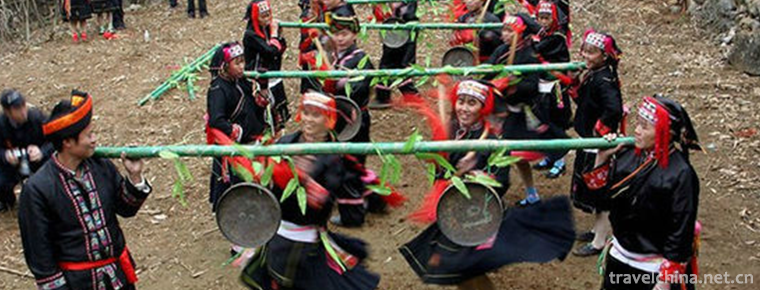Golden Gong dance of Yao nationality
Golden Gong dance of Yao nationality
Golden Gong dance is popular in the villages of Meilin and Pingliao of Dengyao Township in Tiandong County. It is a representative work of Bunuyao folk dance in Tiandong.
In November 2014, the Golden Gong dance of Yao nationality declared by Tiandong County of Guangxi Zhuang Autonomous Region was listed in the fourth batch of national intangible cultural heritage list with the approval of the State Council.
historical origin
Originated from the local Yao people to commemorate their ancestors and thank God of the mountain for the gift. In the old days, it was limited to the activities of rewarding gods, offering sacrifices and exorcising evil spirits. With the passage of time and the changes of time, Golden Gong dance gradually evolved into the main sacrificial dance for celebrating the Lunar New Year in Yaoshan. Every Spring Festival and May 29 of the lunar calendar, golden gong sounds in Yaozhai. People are crazy about singing and dancing. Golden Gong dancing is the main form of activity of emotional alleviation of Yao people, which reflects the whole process of production, life and emotion of local Yao people.
artistic characteristics
Golden Gong dances are mostly collective dances. The number of people can be three or five, or hundreds or thousands. When dancing, a vine or a rope is pulled up in the playground, and the Gong is strung up and hung up. The Gong can also be hung on a bamboo stand or a wooden bracket. The Gong is about 1.5 meters off the ground, so as not to hinder the movement. Because Yao people mostly live on high mountains, their long-term life and work in the mountains make them adapt to the natural environment. For example, when walking on rugged mountain roads, they must raise their feet, exert their toes, twist their waists and contain their breasts. This habit includes "raising their legs and striking gongs", "leaning on their feet and nodding gongs", "crossing their heads with hammers" and so on. "Double mallet backstroke" and "quick turning gong" are all embodied. The wild Gong dance shows the tension of life and the beauty of art. Now, Golden Gong dance is not only a cultural and recreational activity for farmers in the village, but also an indispensable reserved program for major festival activities in Tiandong County. Golden Gong dance is very popular in the local area. In Meilin village, where it originated, men, women, old and young can dance. It is a cultural phenomenon in Yaoshan, and also a popular folk dance program of Tiandong people.
Current situation of inheritance
In 1985, the dance was listed as a development project by the national key project group of art and science planning. In 1992, it was included in the "Guangxi Volume of the Integration of Chinese Ethnic and Folk Dances". In 2006, he participated in the first Baise traditional minority sports competition and won the second prize. Up to now, nearly 100 performances have been performed both inside and outside the county. In 2010, the Autonomous Region announced the list of important intangible cultural heritage projects, including the Yao Golden Gong dance and the Yao Suona in Tiandong. At present, Tiandong is applying for the Golden Gong dance of Yao nationality as an important item of the national intangible cultural heritage.


-
1.Beef noodle
Beef noodle is a common pasta. It is also a traditional food in Lanzhou
Time 2018-10-12 -
2.Ancient Huizhou Cultural Tourism Zone
Huangshan Ancient Huizhou Cultural Tourist Area is located in Huangshan City, Anhui Province, north of Huangshan Mountain, south of Qiandao Lake
Time 2018-12-08 -
3.Zhujiajiao Ancient Town
Zhujiajiao Town, which belongs to Qingpu District of Shanghai, is located in the West and south of Qingpu District, close to Dianshan Lake Scenic Area. It is bounded by Daying in the East and Huanchen
Time 2019-03-20 -
4.Dagudarengrab
Dagudalenglei Biao is the only Creation Epic discovered, sorted out and published by the De'ang people up to now. It is more than 1200 lines long. The epic is different from
Time 2019-04-22 -
5.Shanghai Opera
Shanghai Opera, a local traditional drama in Shanghai, is one of the national intangible cultural heritage.
Time 2019-05-03 -
6.temple fair
Temple fair, also known as "temple market" or "festival venue". It is a Chinese folk religion and the custom of the age. It is usually held on the Lunar New Year, the Lantern Festi
Time 2019-06-05 -
7.Qiangge war
The Battle of the Qiang is the most famous one among the folk epics of the Qiang people. It describes the history of the ancestors of the Qiang people who had experienced hardships and hardships
Time 2019-06-10 -
8.Brewing Techniques of Fen Liquor in Xinghua Village
The brewing process of Fen liquor in Xinghua Village is complicated. Fen liquor in Xinghua Village is finally brewed through six main processes: grinding, moistening, steaming, fermentation, distillat
Time 2019-07-08 -
9.Beijing Institute of Fashion Technology
Beijing Garment College was founded in February 1959, formerly known as Beijing Textile Technology College. In July 1961, it was renamed Beijing Chemical Fiber Engineering College. It was a key univer
Time 2019-09-06 -
10.University of Chinese Academy of Sciences
University of Chinese Academy of Sciences ( University of Chinese Academy of Sciences Referred to as "National Science and Technology University", was approved by the Ministry of education.
Time 2019-12-11 -
11.Neijiang ten sages
Ten sages are outstanding representatives of historical figures in Neijiang, which are described as "one division, two phases, three number one scholars and four great masters";
Time 2020-12-16 -
12.Guangan waterway
Guang'an port is a "port group" composed of Guang'an port area, Huaying port area, Yuechi port area and wusheng port area distributed in Guang'an section of Qujiang River and Jialing River. Guang'an port is an important support for industrial lay
Time 2020-12-19